Every ecommerce website needs a functional platform, as every house needs a strong foundation. The best B2B eCommerce platform plays a vital role in designing website features for business operation and management, securing them from internet attacks, and creating a seamless user experience for visitors.
When it comes to specific business models, typically B2B and B2C, eCommerce platforms separate unique capabilities to suit each business’s needs.
Bear in mind that B2B and B2C are different from customer identity and management to dealing or order processing. Thus, these two types of business models tend to select the best wholesale ecommerce platform with appropriate features to optimize usage and save costs.
This article will explore our best B2B eCommerce platform comparison to determine which platforms are most suitable for B2B business and pick one for additional analysis.
For those considering the best platform for your B2B website, we’re here to help. You just simply fill in a form and we’ll define which will match you the most based on your budget and requirements. Check here >>>
Let’s get started!
I. What is a B2B Ecommerce Platform?
Table of Contents
An ecommerce platform, as you have already known, is a software application for online businesses to manage their websites from A to Z.
Along with various features that target every section of a business, ecommerce platforms have become one of the most dispensable factors to form a complete online store.
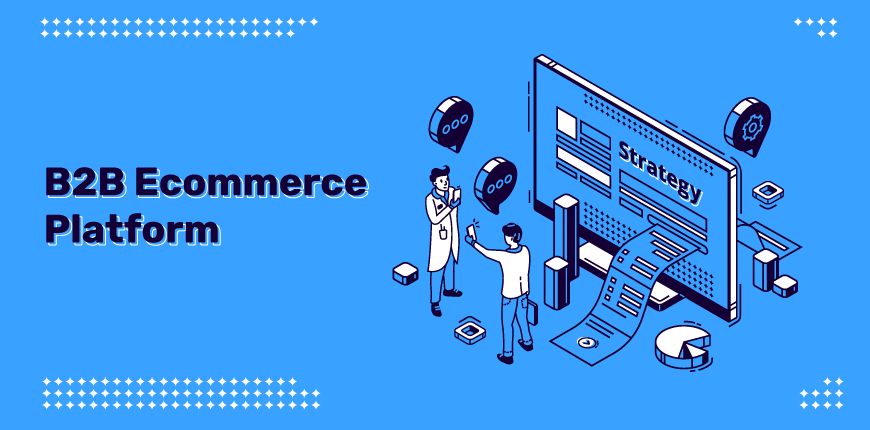
So what is a B2B ecommerce platform? Are there any differences from the ecommerce platform, in general?
To define “what is a B2B ecommerce platform,” we can simply say that it is a platform that contains specific functions for the wholesale industry. A B2B website built on the B2B ecommerce platforms can utilize business performance and optimize productivity.
Hence, researching and deciding which platforms to use often take more time than B2C.
Although the best B2B Ecommerce platforms do not make much difference from B2C ones, more certain functionalities and customization are needed.
The complicated relationship between wholesalers, stakeholders, and decision-makers forces B2B ecommerce businesses to form a streamlined flow on their websites and crave the best eCommerce platform for B2B.
DIVE INTO the Entrance To B2B ECommerce: Well-Prepared With B2B Website Features
II. Best B2B Ecommerce Platform Features

In order to facilitate B2B websites to sell products and manage operations, ecommerce platforms are required to include B2B-driven features and provide a better B2B experience on the customer journey.
These built-in features of the best B2B eCommerce platform are unique to a B2B website and are rarely found in B2C ecommerce.
JUMP INTO B2B website features to comprehend what you need for your B2B online construction.
1. Access restriction options
Why do B2B websites need to restrict access to specific customers? Whether this B2B ecommerce platform feature is necessary or not?
Let’s go together for a detailed explanation.
B2B is never as easy as our thoughts. While we always connect to a B2C website effortlessly and then go shopping, B2B takes us more steps.
Due to the complexity of target customers and approach methods related to many stakeholders, the best eCommerce platform for B2B is expected to deliver various experiences depending on specific users.
It is necessary to decide whether to allow or limit access to some sections on the website. There may be no need to restrict the whole website; you implement these rules for places that are only accessible by B2B customers.
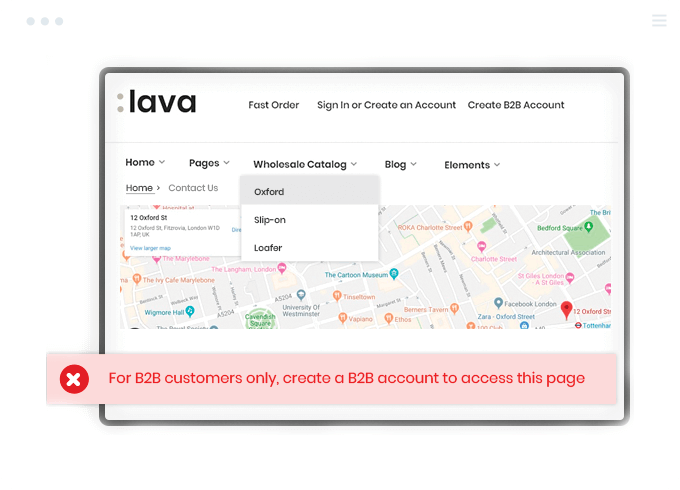
What benefits does this best B2B ecommerce platform feature bring?
- Offer group shopping experience for only B2B customers who may receive incentives for pricing or discounts
- Avoid rivals’ scrutiny and intense competition
- Segment B2B and B2C customers in the first place
2. B2B customer identity and management
Customers are by no means essential to a business, and B2B online stores are no exception.
How to identify a B2B user, then make customer segmentation in the first place become an integral part of a B2B ecommerce business.
If you intend to do business for both B2B and B2C customers, you are forced to separate account registration for these two groups.
Taking advantage of the only signup form for both prospects seems to be an unwise strategy. B2B customers had better be managed differently from B2C, with more actions in the future, such as generating company accounts or assigning sales reps to be in charge.
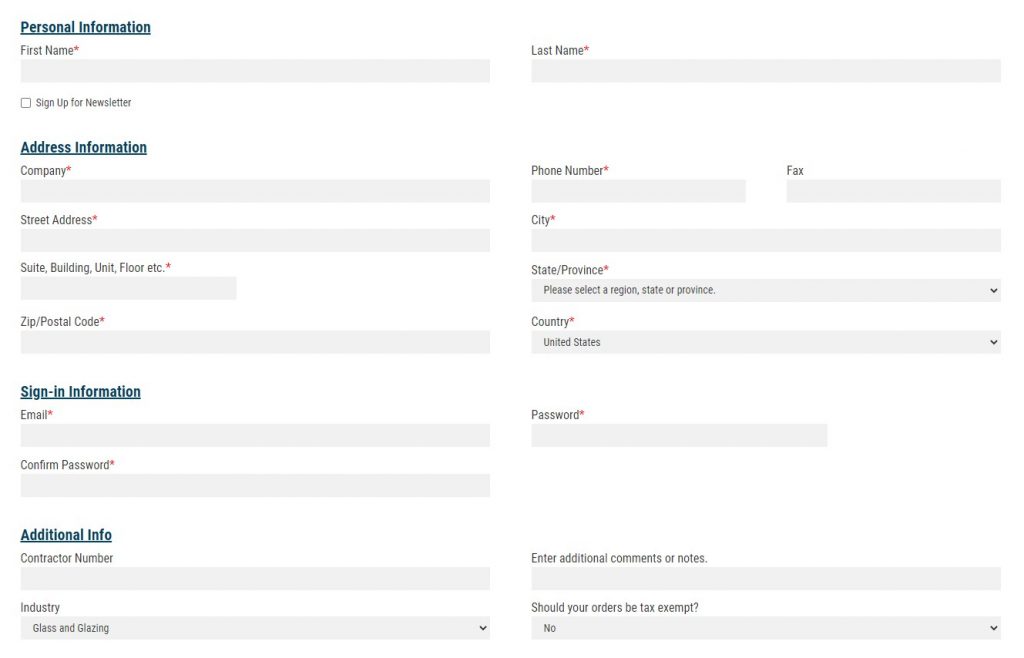
Besides, collecting adequate B2B customer information should not be neglected anymore. The more data you get in your hands – the better you understand customer profile and behavior to determine strategies. Thus, the best eCommerce platform for B2B that suits business-to-business companies has to provide store owners with feasible solutions to aggregate databases and manage them effectively.
GET CURIOUS TO READ MORE: Customer Data Management & B2B Online – Strong Bond To Raise Engagement.
3. Custom pricing
B2B dealing often undergoes a wide range of stages before making the end decision. Discussion about pricing, quotation, shipping, or additional benefits takes more time and effort than B2C.
Despite various stakeholders’ attendance, take notice that B2B appreciates high customization in most steps in the purchase process, especially custom pricing – one of the must-have B2B ecommerce platform features.
When there are various customer groups in a B2B business, you cannot put the only pricing for all. Once you accept to divide customers into specific groups based on your intention, product characteristics, or order size, it means special treats of pricing for each.
For example, a customer group cooperating with your store for a long time may receive much more discount than an entirely new customer.
Accordingly, the best B2B eCommerce platform should equip custom pricing functionalities to allow store owners to customize different pricing for each customer.
4. Payment
As mentioned above, high customization is a must in B2B. Not only pricing but also payment also requires B2B ecommerce businesses to develop appropriate solutions for a better approach.
When it comes to B2B ecommerce platform features regarding payments, there are some prevailing payment methods from traditional ones to modern technologies:
- Trade credits
- Purchase order
- Paper checks
- Cash on delivery
- Credit cards
- Bank transactions
Once you decide to go digital with the best B2B ecommerce platform, make sure that the chosen platform provides you enough methods suiting with B2B customers and the purchase process. The paper check maybe not be proper in this case, and you have to consider it more during research.
5. Bulk orders
B2B business is symbolized by a large amount of order and high order frequency. Unlike B2C, B2B customers often demand a larger quantity of products in order; hence, store owners must equip an ecommerce platform that allows customers to order in bulk quickly and smoothly.
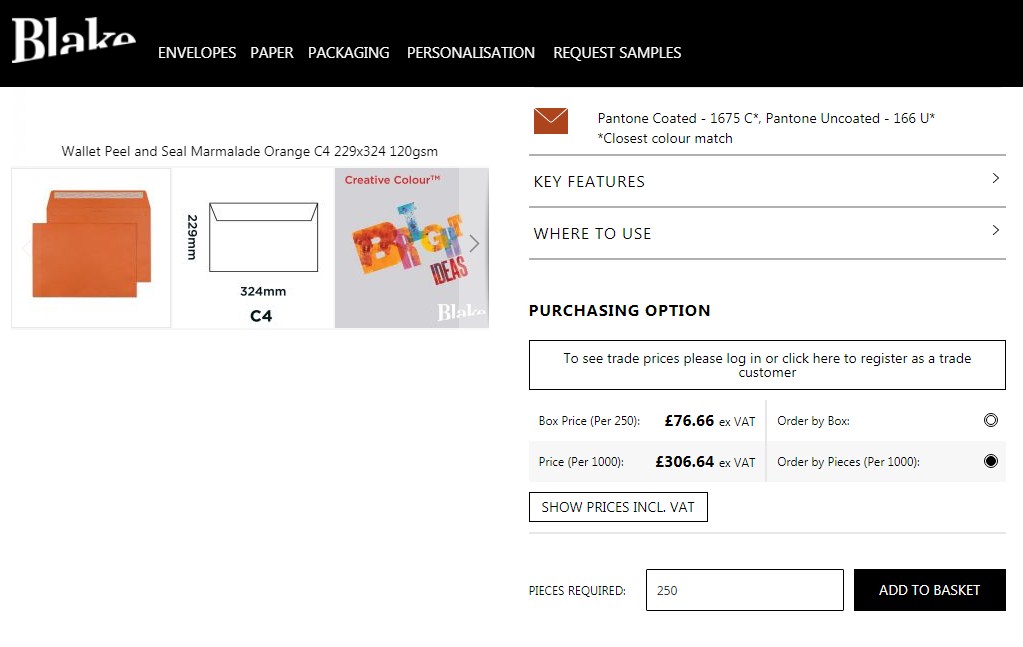
The best B2B eCommerce platform may facilitate this order process by entering product information in a form to purchase massively or import items via a CSV file to put plenty of products to cart effortlessly.
>>> CLICK HERE and find out Top 5+ B2B ECommerce Challenges & Solutions Of 2021
6. Heavy focus on user/customer experience
User experience always takes a high priority for a website whenever they make a decision to build an ecommerce website. If a customer has a positive shopping experience on your website, your sales may skyrocket.
Of course, a satisfying and enjoyable experience for visitors browsing a website is not a simple task because it resonates with website functionality, design, and even customer feelings.
One thing that should be bear in mind is: B2B customers concentrate on individualization – they crave their own experience.
Thus, the best B2B e-commerce platform must enhance its UI/UX features with optimization options, especially customization or personalization for now and the future.
Some perspectives can be counted, such as:
- User-friendly and intuitive website design
- Highly customizable options
- Responsiveness on every device
- Timely response with dedicated support
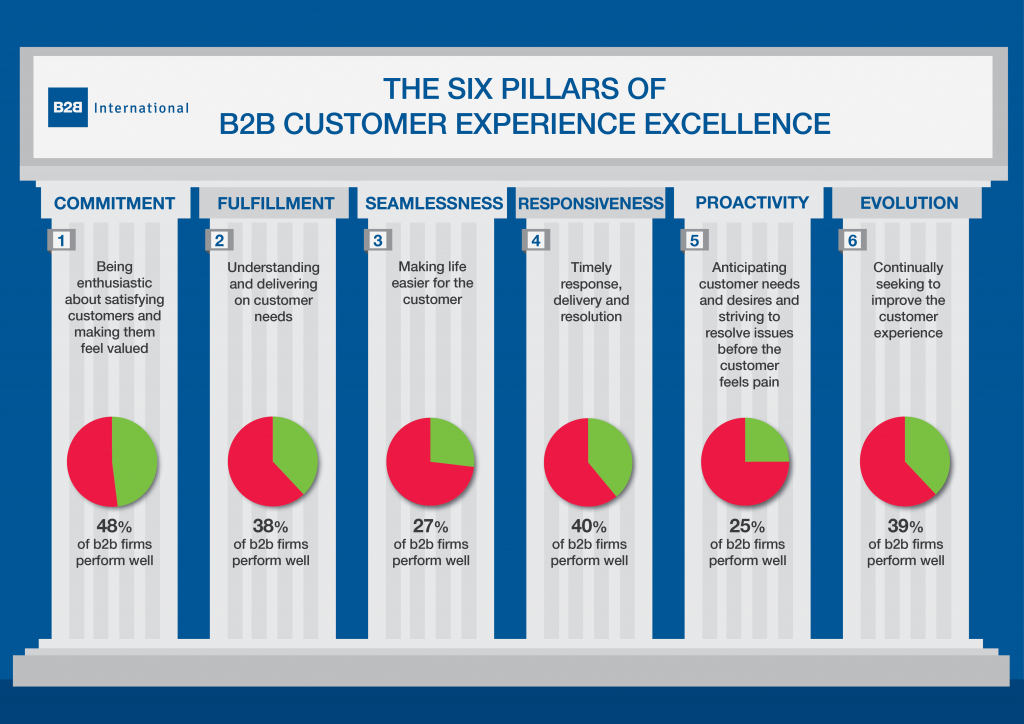
Source: B2B International
III. Top 16 Best B2B eCommerce Platforms Comparison
It’s time to explore how many B2B eCommerce platforms may suit your business and their outstanding functions to reinforce website performance.
Let’s go to the detailed B2B eCommerce platform comparison now!
1. Magento 2 B2B Commerce
As you may know, Magento is one of the leading eCommerce platforms in the world. A lot of big brands are using Magento to build websites such as Coca-Cola, Samsung, Ford, and so on.
–>> EXPLORE B2B Web development or Magento 2 services to get the most suitable one for your business.
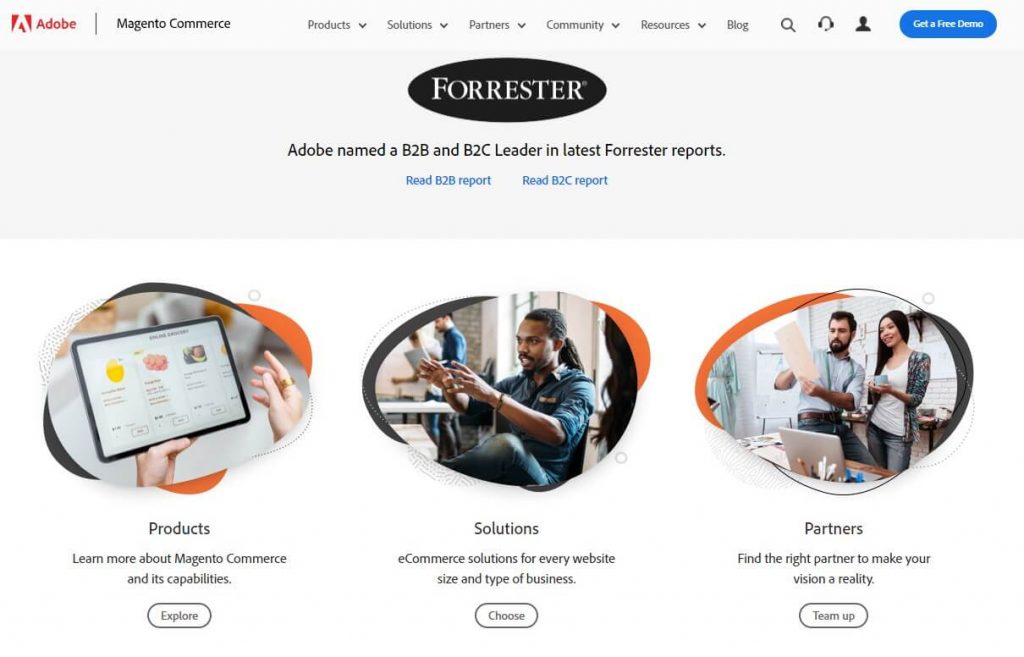
Magento impresses users with high scalability and customizable ability as an Open Source platform. Despite its complexity, Magento solves the problem of large databases, which few platforms can handle.
Since being acquired by Adobe in 2018, Magento has been improving its products and services by developing more solutions for merchants, both Magento 2 B2B and B2C. Order management, Progressive Web Applications, product recommendation, or Omni channels are useful for combining and leveraging business performance.
More importantly, Magento also provides a version as Magento 2 B2B Commerce that targets wholesale business with a diversity of must-have features to operate online stores effectively and gain complete control.
CRAVE IT FOR NOW: Full Magento 2 B2B features are explained in one place!
Additionally, there are a vast number of Magento service and extension providers on the market, which don’t limit your customization for your website, even if you are not tech-savvy.
Let’s see what this best e-commerce platform for B2B does obtain:
Pros:
- Robust admin management
- Extensive Magento 2 B2B features
- No limit to customization
- A considerable number of extensions and themes for better website development
- Mobile-friendliness
- SEO-friendliness
Cons:
- High costs for Magento Commerce (Magento Open source is totally free)
- Needs of hostings
Pricing:
- Magento Open Source: Free
- Magento Commerce: Start at $22,000/year
- Magento Cloud Commerce: Start at $40,000/year
Payment methods: 6 methods, including PayPal, Braintree, Klarna, Amazon Pay, Authorize.net, and Zero Subtotal Checkout.
B2B features:
- Catalog restrict access
- Company account with multiple sub-users
- Sales representatives
- Request to Quote
- Quick ordering
- Requisition lists
- Company credit limit
- Shared catalog
- Purchase orders
Time to market: 1-3 months.
ABSORB our Magento vs Shopify vs BigCommerce comparison chart – the most detailed resource ever NOW
DOWNLOAD our FREE Hyva Theme Handbook to deeply understand the most outstanding Magento frontend solution.
2. Shopify Plus
Shopify appears as a rising star on the best B2B eCommerce platform map. Typically, Shopify concentrates on small businesses, requires little technical knowledge or skills, and enables store owners to manage their websites from A to Z.
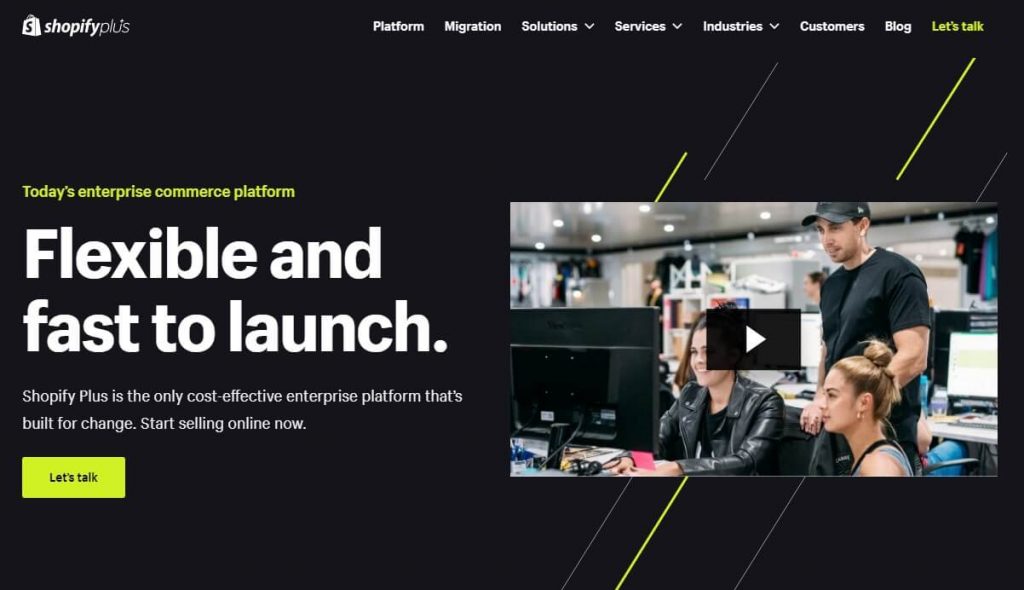
Shopify Plus is a version of Shopify to make enterprises more potent with advanced functionality. With a simple and intuitive user interface, Shopify Plus removes any obstacles and assists all users in getting familiar immediately.
Another strength is simplifying transactions by providing a plethora of options for customers to choose from. However, it is the simplicity that can cause your website to extend capacity when it reaches a certain time.
Let’s see what this best e-commerce platform for B2B does obtain:
Pros:
- Time-saving to build an online store
- Affordable and predictive cost
- Seamless user experience
- Various built-in tools
Cons:
- Content management limitation
- Lack of multi-store support
- Limited backend customization
- Lack of SEO control
- Payment methods are unavailable in some countries and charge additional fees for users.
Pricing plan:
Although Shopify does not reveal pricing for Shopify Plus, many people say that the pricing can be more than $2,000 per month.
Payments methods: More than 100 methods, including PayPal, Authorize.net & Shopify payments.
B2B features:
- Customer group discounts
- Website restrictions: customers need to enter passwords to access storefronts.
- Custom pricing
- Shopify shipping that calculates real-time shipping rates and prints shipping labels.
=> B2B functionality is fundamentally built-in Shopify Plus, but store owners need more apps to add advanced features to the wholesale business.
Time to market: 14-60 days (a basic B2B store).
⇒ Read more: Magento 2 Commerce or Shopify Plus.
3. SAP Commerce Cloud
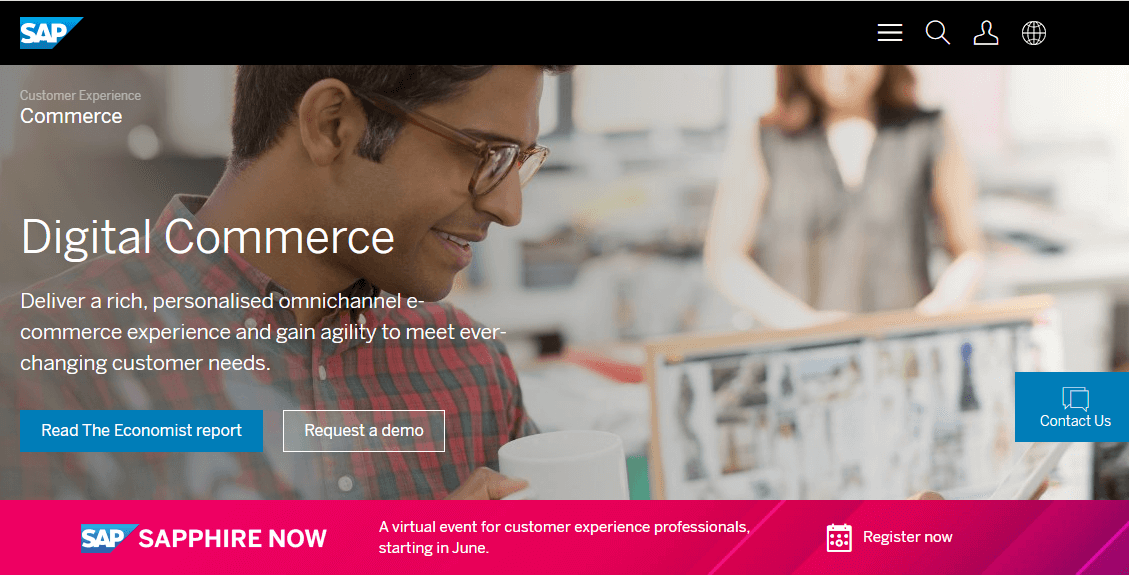
In general, SAP (System Application Programming) is one of the most prominent Enterprise Resource Planning (ERP) vendors and enterprise applications available today. In an integrated interface, the company’s ERP system allows users to run the software and business processes, including accounting, sales, manufacturing, human resources and finance.
In terms of the best B2B eCommerce platform, SAP has developed SAP Commerce Cloud, a flexible Omnichannel platform. It contains a wide range of functionalities to optimize an eCommerce platform, including CRM, marketing automation, and other data integrations among SAP’s services.
The platform supports presenting your products and services outstandingly. It also serves as effective analytics and reports tools, helping users gain a 360-degree view of their customers. Thus, SAP is still well-known as an ERP system that has served over 400.000 customers. Probably the figure could be much higher in recent times.
Check out what this best B2B e-commerce platform brings users:
Pros:
- Omnichannel fulfillment
- Involvement of many business solutions: CRM, ERP, CSV, ImpEx, SAP system, etc.
- PCM (Product Content Management) plugin
- Ability to collect and analyze data from many sources
- Easy to use
Cons:
- Small community support
- Deep understanding and high technical skills requirement
- Ineffective reporting and analytics capabilities
- Heavy customization
- Costly
- Time-consuming
- Difficult scalability
Pricing: starting from $100k/year, $50k/license
- Standard Edition: Contact for detail
- Professional Edition: Contact for detail
Payment Methods: Cards, e-checks, digital wallets: Apple Pay, PayPal, and Visa Checkout
B2B Features:
- Back office integration
- Early login
- Self-service account management
- Custom pricing and catalog
- Price quote requests
- Credit management
- B2B order form
- PunchOut Support
Time to market: A few weeks.
⇒ Read more: Magento vs SAP Commerce Cloud.
4. Salesforce Commerce Cloud
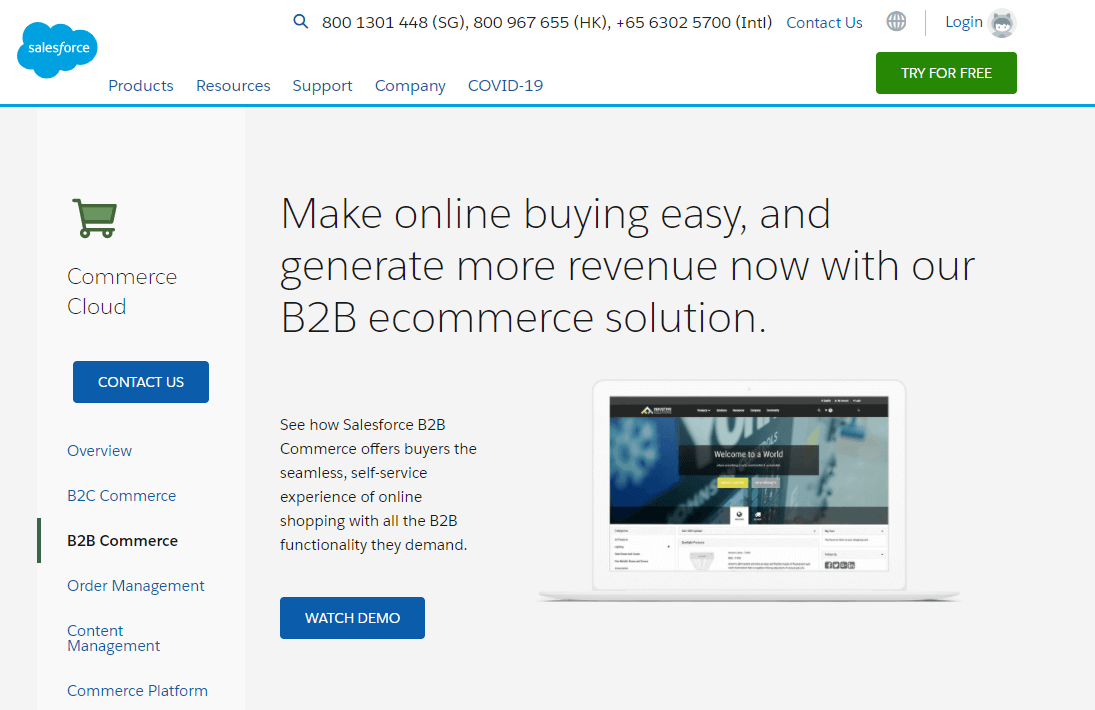
Salesforce is well-known as a CRM (Customer Relationship Management) platform.
Salesforce is the world’s leading company in cloud computing and is undisputedly the number one CRM solution provider in the world today. Salesforce started as a service-type software (SaaS) company in terms of CRM.
Among Salesforce’s services and products, Salesforce Commerce Cloud is a cloud-based SaaS (Software as a Service) eCommerce technology that helps businesses develop and optimize their online stores by providing high scalability, out-of-the-box features and accessibility.
With built-in B2C functionalities, Salesforce Commerce Cloud is one of the best options for retailers. Notably, it has recently launched the B2B Commerce Cloud. Hence, Salesforce Commerce Cloud can target both retail and wholesale businesses.
Check out what this best B2B eCommerce platform brings users:
Pros:
- SaaS-based platform with the guarantee policy from Salesforce
- Powerful merchandising functionality
- Effective catalog management
- Personalization and machine learning
- Effective omnichannel solution
Cons:
- Limited B2B functionalities
- Small community support
- Fewer integrations
- Limited customization due to complete management of Salesforce
Pricing: following the GMV (Gross Merchandise Value) model, calculated based on the percentage of the total amount of merchandise sold on an online platform.
- B2B Commerce – Starter: 1% GMV
- B2B Commerce – Growth: 2% GMV
- B2B Commerce – Plus: From 2% GMV
Payment methods: Credit card, ACH (Automated Clearing House), or cash.
B2B Features:
- Custom catalog
- Quote (Negotiated pricing)
- Fast reorder
- Account hierarchies
Time to market: In weeks.
⇒ Read more: Magento Vs Salesforce Commerce Cloud: Must-Read For Smart Choices?
5. Intershop Communications AG
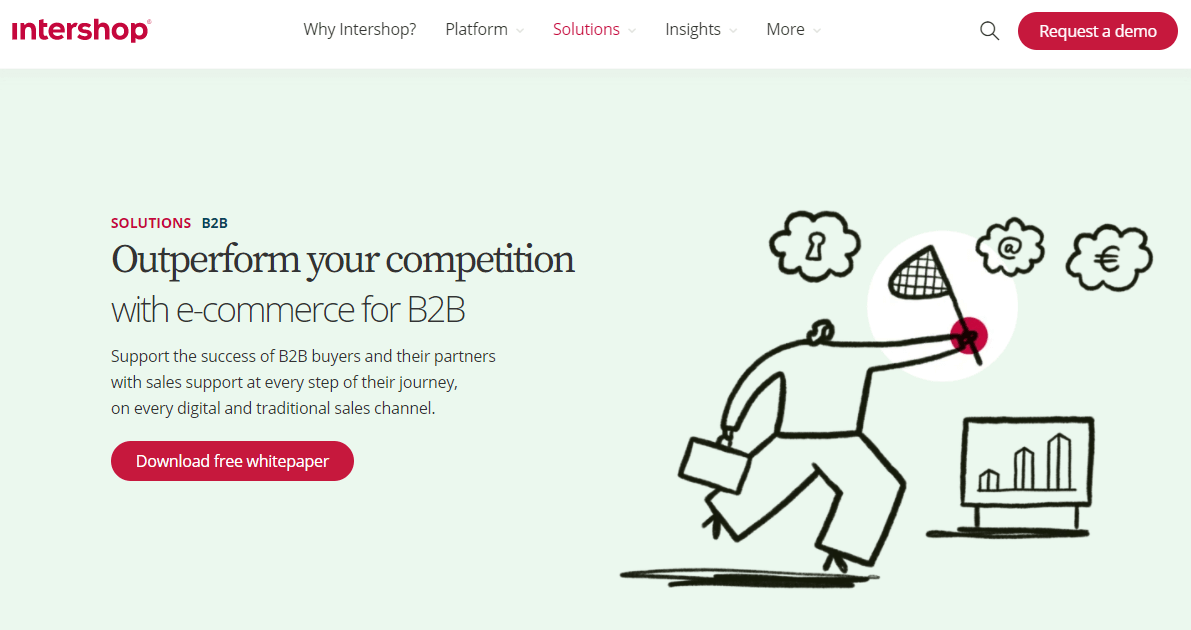
Intershop Communications AG, founded in Germany in 1992, is the leading B2B eCommerce platform specializing. Intershop Communications AG not only provides you with the best B2B features but also flexibly adapts to your demands, helps your business reach new customers and generates more revenue.
Regardless of your target customers, Intershop will help your company exceed digital commerce goals. According to Forrester, Intershop is the best option for manufacturing companies, and they also appointed Intershop a “Strong Performer.”
This best B2B eCommerce platform is what B2B businesses need. Intershop mainly focuses on wholesalers, distributors, and manufacturers, which creates a competitive advantage. However, it is also suitable to target both B2B and B2C customers on a single platform.
Something interesting that the best e-commerce platform for B2B brings users:
Pros:
- Strong B2B solution
- Flexibility to use modern front and technologies such as Angular, ReactJS, etc.
- The ability for businesses to expand in many areas
- Lots of functionalities and options
- Easy scalability
- One-time installation
Cons:
- Difficult-to-read documents
- Time-consuming when upgrading
- Challenging when adding, editing options without professional developers
Pricing: starting at $100.000, based on transaction volume, calculated using GMV or the number of orders
Payment methods:
- Cash on delivery
- Direct debit transfer
- Invoice
- Cash in advance
- Gift card
B2B features:
- Clear & user-friendly order process
- Convenient self-service
- Multi-step, multi-users approval processes
- Easy Open Catalog Interface (OCI) integration
- Digital customer portal to support the full customer life cycle
- Control all product information at a single central system
- Strong internationalization capabilities
>>> CLICK HERE and find out Top 5+ B2B ECommerce Challenges & Solutions Of 2021
6. Elastic Path Software
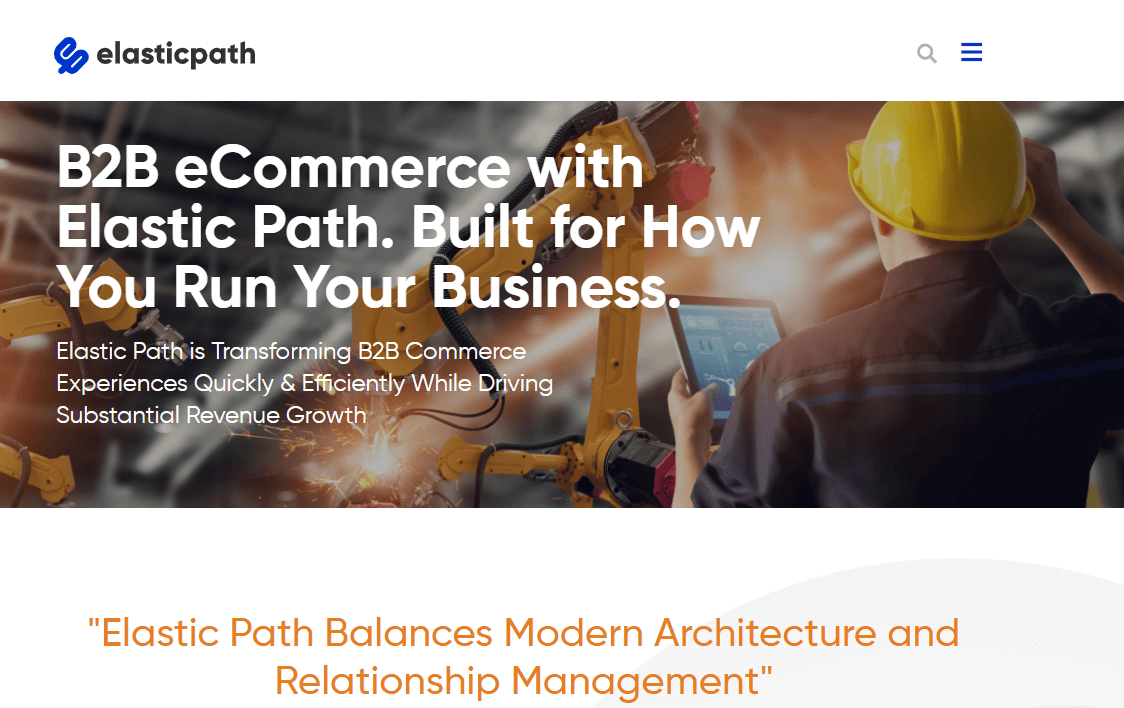
Elastic Path is a headless commerce microservices solution. It is the pioneer of composable commerce, which aims at moving away from the full-stack eCommerce platforms. By developing Packaged Business Capabilities (PBCs), Elastic Path wants to create the best eCommerce solutions.
In case you are wondering, Elastic Path might be suitable if you have a unique image of your business, which you want to bring to reality with UX design and omnichannel touchpoints. Elastic Path is worth considering with high flexibility, scalability and customization.
Check out the features of this best B2B eCommerce platform:
Pros:
- 3 level approach in the cache framework
- Robust Cortex API architecture
- Logging frameworks available with Log4j
- Maximum data security
- Among the fastest performing platforms
- Unparalleled customizability
Cons:
- Challenging to deal with for amateur
- Lack of content management features
- Lack easy access to the product management tools and versioning of catalog items
- Possibility of the API to be exposed
Pricing: Starting at $50,000 and adjusting for order volume and other needs.
Payment methods: Accept payments in over 200 countries with access to 100+ gateways
B2B features:
- Account management
- Personalized catalog and pricing
- Complex catalog management
- Product and service bundles
- Quick order, bulk order and reorder
- Flexible promotions and payments
- Intelligent search and merchandising
- Punchout catalog
- Multi-brand, multi-currency, multi-country in a single platform
- Commerce enables the IoT
Time to market: 3-4 months
7. Apttus (Conga)
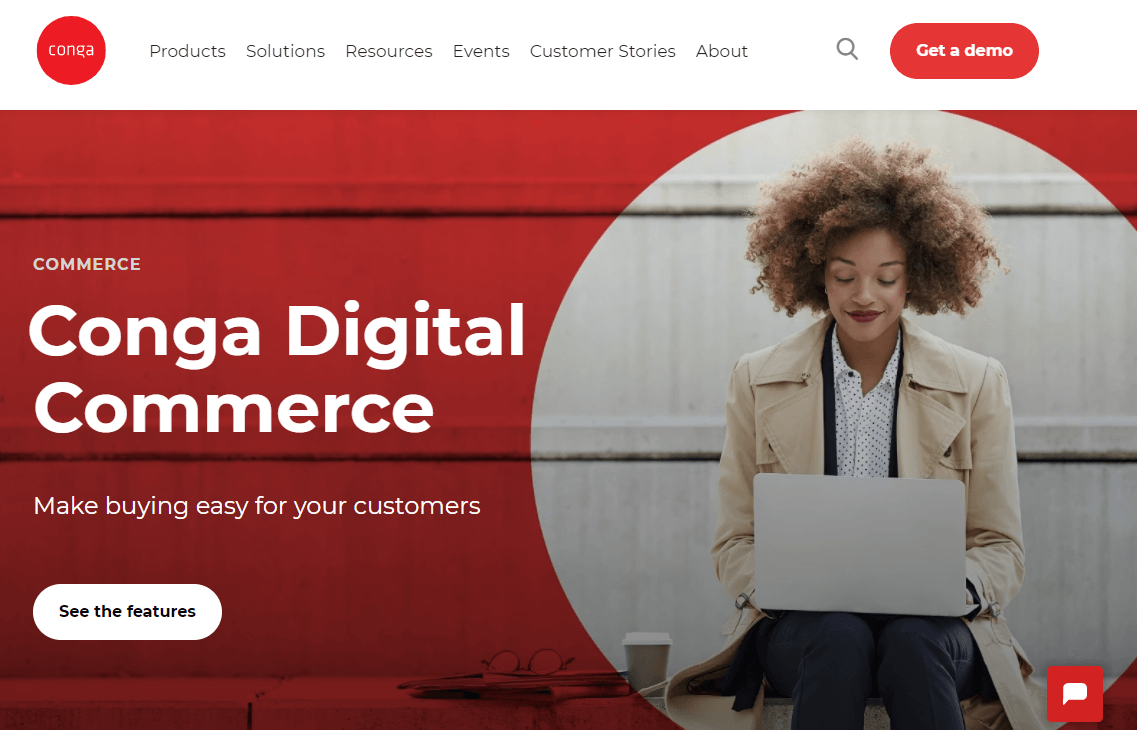
Founded in 2006, Apttus is an American B2B software provider specializing in business process automation. To leverage B2B processes in enterprises, the company offers a “middle-office” solution that utilizes AI to develop and optimize several business functions such as financial, commercial, etc.
Apttus is the pioneer in the Configure Price Quote (CPQ) – a sales tool to generate quotes for orders quickly and accurately. Also, it provides a robust, enterprise-level Contract Lifecycle Management tool to manage the contracting processes effectively. Although Apttus is not exclusive to Salesforce, it has prioritized becoming the go-to Quote-to-Cash provider for Salesforce users.
Recently, in May 2020, Conga announced that Conga and Apttus were merged together in a $715 million deal to expand and develop more strongly in the eCommerce market.
This powerful combination helps businesses to adopt processes, streamline workflows, build and distribute digital documents, quotes, and contracts more efficiently as part of their digital transformation journey. Because of this merger, Apttus has been renamed following Conga.
Check out the features of this best B2B eCommerce platform:
Pros:
- Collect data directly from Salesforce
- Quick and easy documents generation
- Easy to find a suitable template for each business
- Flexible templates
- Configurable parameters for special requirements
- Good customer service
- Easy to handle complex pricing rules
Cons:
- Some unresponsive pages
- Lack of reporting options
- Not so mobile-friendly
- Premium support purchasing requirement
Pricing: Contact for more details
Payment methods:
- Credit card
- Debit card
- Purchase order
Highlighted B2B features:
- Quotes
- Bulk orders
- Reordering
- Sales reps
- CLM tools
Time to market: No information
8. Sana Commerce
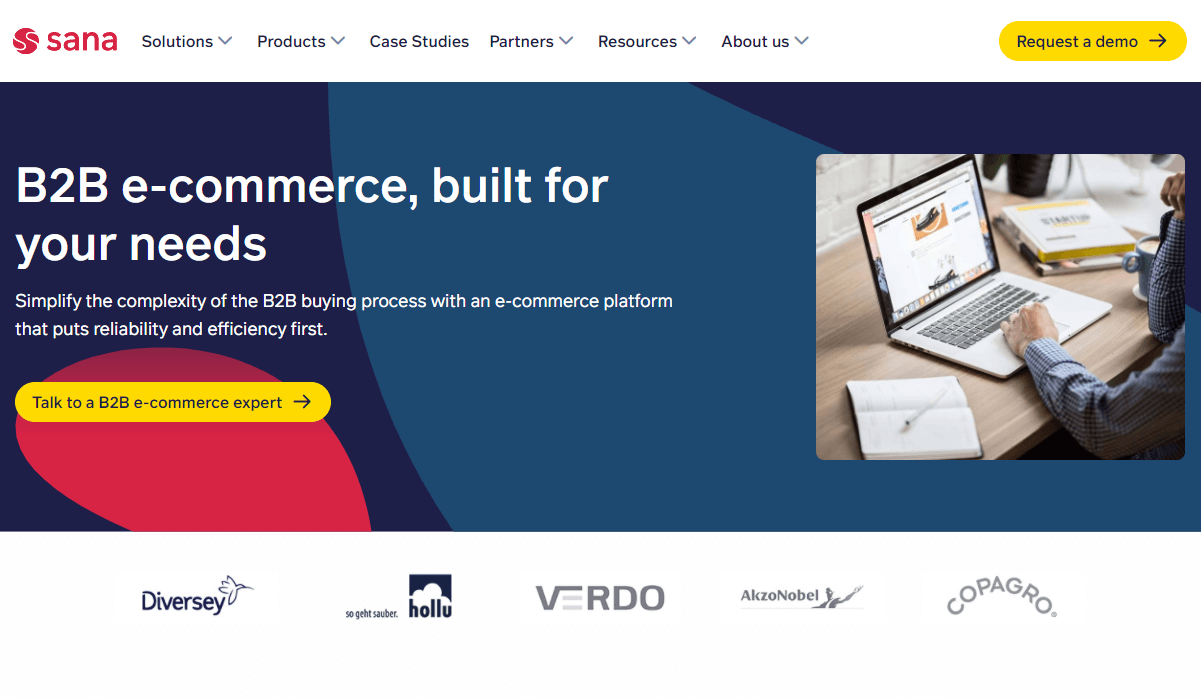
Sana Commerce is a B2C and B2B eCommerce platform with ERP integration, which is also the foundation of Sana Commerce. Sana Commerce has tried to leverage the ERP as its primary source of information to develop the top eCommerce platform.
Unlike almost all other B2B eCommerce platforms, which are usually developed purely as a standalone platform at first and third-party ERP integration later, Sana Commerce makes it stand out from the crowd. The provider makes sure to integrate the ERP system at the very beginning.
Sana Commerce is also well-known for its B2B capabilities. Realizing the differences between B2B and B2C, the Sana Commerce platform includes all necessary features. Besides, ERP integration makes the customer purchasing experience much more consistent, reducing the complexity of B2B transactions.
Sana Commerce wants merchants to know it as an ERP-integrated-eCommerce platform. Its focuses are small wholesalers, manufacturers, and distributors to help them smoothen the B2B sales process, satisfy as many customers as possible.
Check out what this best B2B eCommerce platform brings users:
Pros:
- High scalability and flexibility
- Feature-rich
- Excellent testing capabilities
- Unlimited customizability
- Brand identity and brand image improvement
- PWA (Progressive Web App): Fully responsive, mobile-friendly
- Large community
- Many solutions developed by third parties
- Availability of multiple extensions
Cons:
- High practical experience and technical skills requirement
- Difficulties in implementation
- Take much time to market
- Need of good hosting environment
Pricing: Sana Commerce has not provided its pricing.
Payment methods:
- Authorize.Net
- ChargeLogic (available as add-on)
- DIBS
- Docdata
- Ingenico
- PayPal Express Checkout
- PayPal Payflow Link
- Other methods available as add-ons
B2B features:
- Provide correct product and pricing information
- Utilize the integrated ERP system to track order fulfillment and efficiently manage the complicated delivery process
- Offer a full-time self-service for customers to place orders anytime
- D2C sales support
- Bulk ordering
- Multiple payment options
- Effective promotions management
- Stimulate reordering.
⇒ Read more: Magento vs Sana Commerce comparison chart.
9. BigCommerce
BigCommerce is well-known for being one of the leading clouds B2B eCommerce platforms that cost lower for ownership but higher flexibility of APIs.
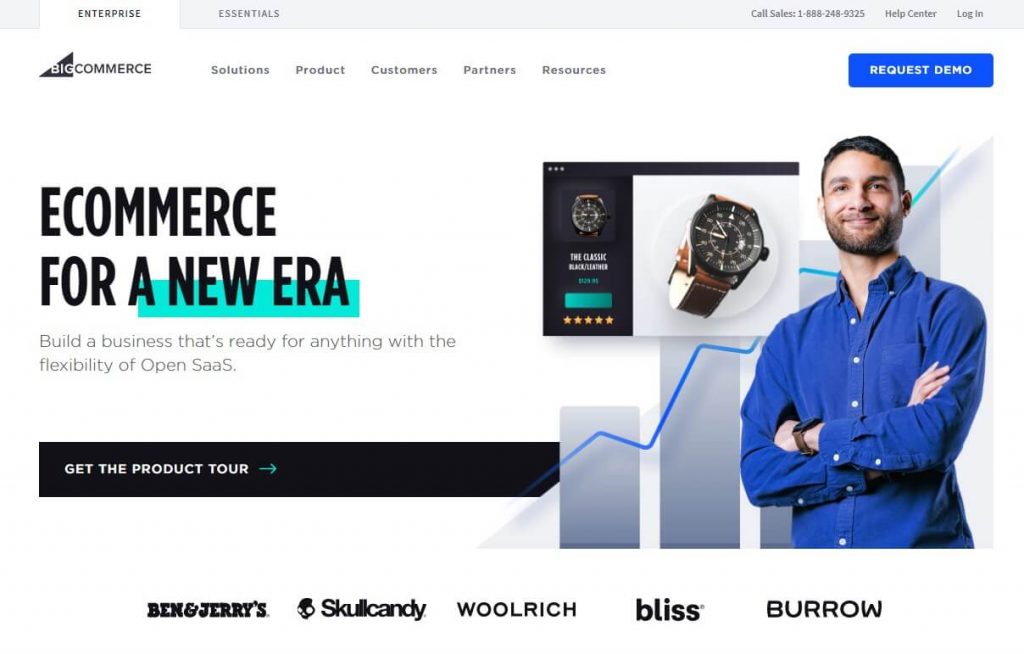
Enterprises are made easier to customize pricing or catalogs for different customer groups, both B2B and B2C merchants, with this platform’s help.
Also, because BigCommerce includes complicated built-in features, the learning curve is higher than other SASS platforms. Nevertheless, it is not a big obstacle for newcomers when Bigcommerce always provides detailed documentation with dedicated support teams.
Let’s check the highlights of this best B2B eCommerce platform:
Pros:
- User-friendly storefronts
- Fast loading websites
- Numerous integrations from the library
- Well-managed product inventory
- No transaction fee
- Great SEO features
Cons:
- Limited promotion and discount options
- Expensive themes (7 free themes and premium themes’ price =s range from $170 to $195)
- An expensive pricing plan is a must if your sales exceed the annual sales threshold corresponding to the current plan
- More miniature app marketplace than other platforms.
Pricing plan:
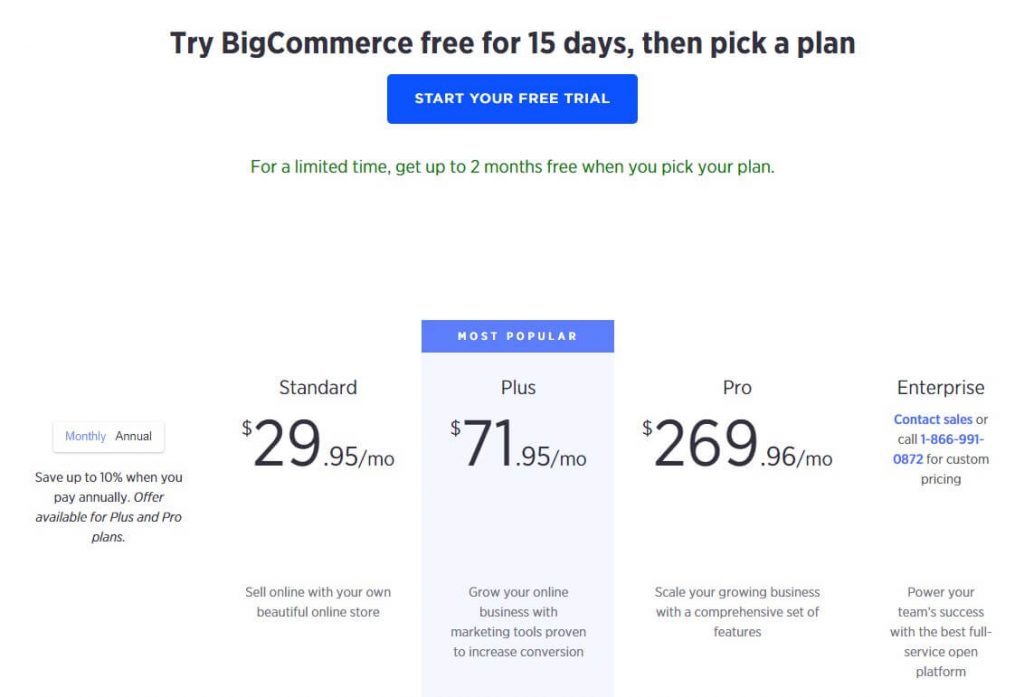
Payment methods: Over 40, including PayPal, Authorize.net, Stripe, Square,…
B2B features:
- Customer group discounts and price-lists
- Basic custom pricing and discounts
- Print shipping labels with Shipping feature
- Paid B2B application suite
Time to market: 3-9 months.
⇒ Read more: Magento vs BigCommerce.
10. OROCommerce
Unlike the mentioned ecommerce platforms, OROCommerce is representative of the ecommerce platform that only serves B2B business; hence, it meets the unique demands of wholesale merchants.
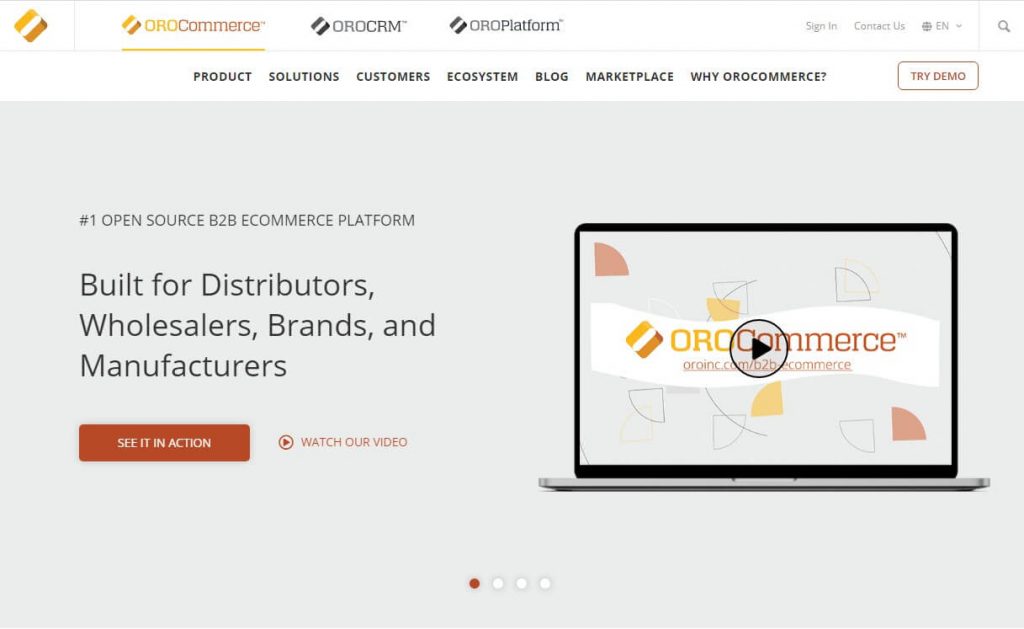
This platform provides you with comprehensive features to expand to the new market with your online and mobile presence. Using OROCommerce, you gain both ecommerce and CRM in one solution to support sales generation, improve vendor management, and assist multiple operation teams to receive wanted information.
Being an open-source platform, OROCommerce brings code transparency, product reliability, and tested security for developers and the community to make improvements.
Let’s see the highlights of this best B2B eCommerce platform:
Pros:
- A B2B-centric ecommerce platform
- Out-of-box integrations (OROCRM or Marketing tools)
Cons:
- Limited extensions for making websites more advanced
- Limited development availability and support
Pricing plan:
- OROCommerce Community Edition: Free
- OROCommerce Enterprise Edition: Not public – need to contact with OROCommerce
Payment methods: 8 methods, including PayPal, Authorize.net, Infinitepay, CyberSource,…
B2B features:
- Corporate account management
- Website access control
- Multiple price lists and shopping lists
- Personalized catalogs
- Request to quotes
- Quick order form and reorder
- Order approval
Time to market: 4-6 months.
⇒ Read more: Magento vs OroCommerce.
11. Oracle NetSuite
If you tend to operate a B2B business with multiple channels, both brick-and-mortar and click-to-mortar stores, NetSuite may be the right choice for your B2B Ecommerce solution.
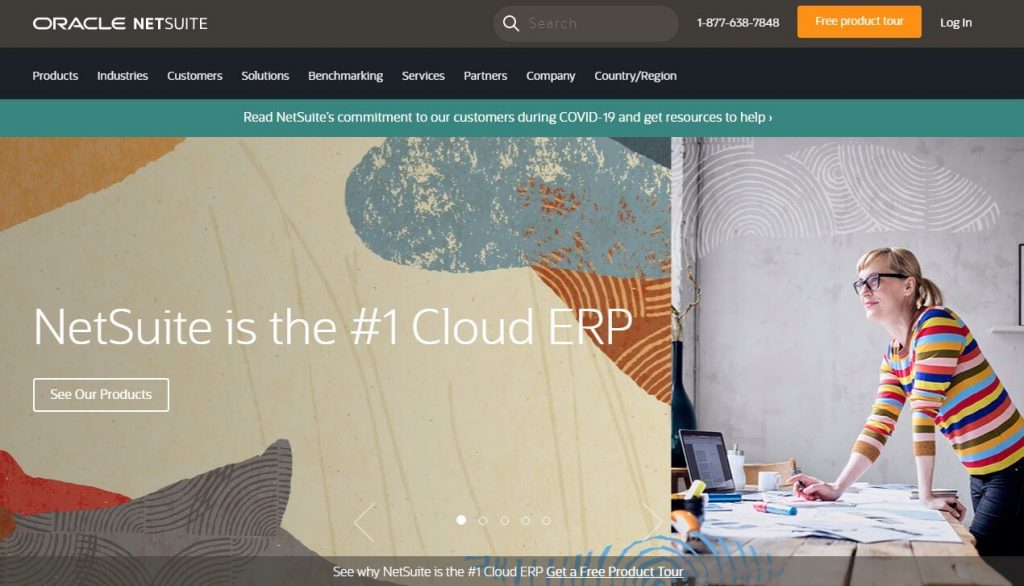
NetSuite strengthens customer engagement on various channels and offers personalized services and B2B seamless experience for both suppliers and consumers.
High scalability and extensive integrations (CRM, ERP) are also ideal for large enterprises to facilitate the whole B2B operations.
Additionally, This best e-commerce platform for B2B provides users with automated operations, high real-time visibility, and built-in business intelligence.
Check out what this best B2B eCommerce platform brings users:
Pros:
- Exceptional integration with CRM and ERP
- High level of customization
- Powerful reports
Cons:
- High complexity
- Lacks of automation, integration and functionality needed in large enterprises
- Limited built-in reporting capabilities
- Time-consuming to update currency
Pricing plan:
The pricing plan is not provided by the vendor and you need to contact them for more details.
Products: Unlimited.
Payment methods: PayPal Express, Credit Card, ACH Vendor Payment,…
B2B features:
- Custom catalog and pricing
- Account hierarchies and permissions
- Repeat and bulk ordering
- Request for quotes
Time to market: 30 days or less with support from the Netsuite team.
⇒ Read more: Magento vs Oracle Netsuite.
12. Episerver
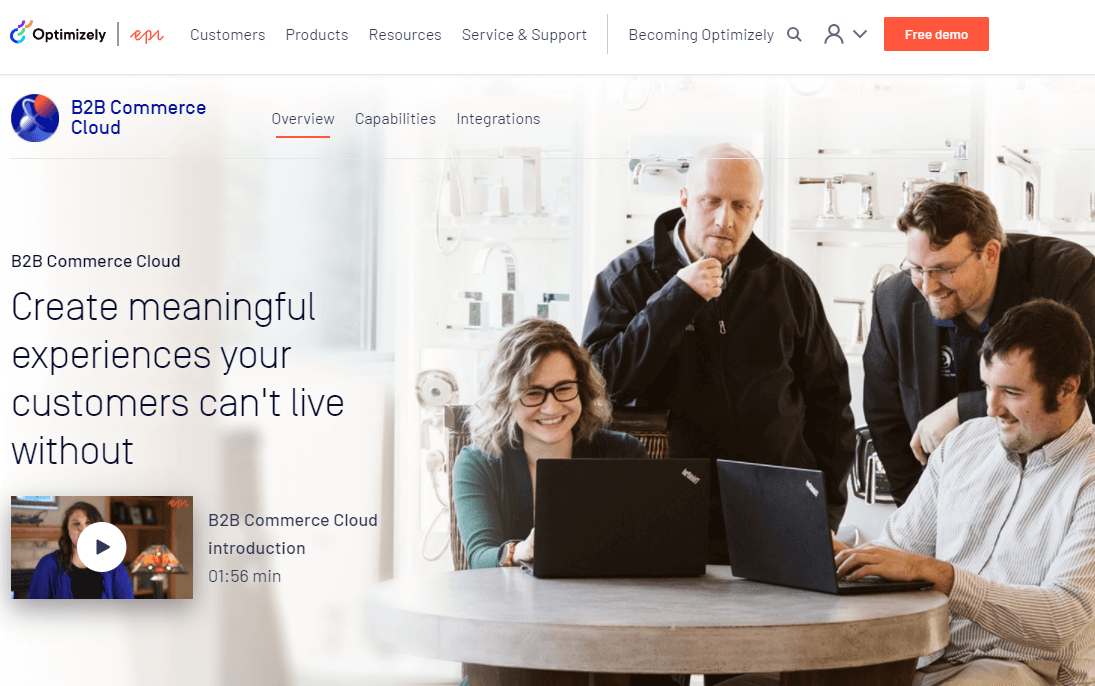
B2B and B2C in one place are what makes Episerver succeed. In the booming of technology, the digital shopping experience is of the utmost importance. And Episerver was born for such a purpose.
Episerver aims to connect Web Content Management (WCM or CMS) digital commerce and digital marketing to support businesses, corporations, and organizations to create unique and streamlined purchasing experiences.
Founded in 1994, headquartered in Sweden, Episerver is one of the most long-lasting software companies. The company has just rebranded Optimizely, which was acquired in October 2020.
In terms of B2B, Episerver has a B2B Commerce Cloud with enormous capabilities, robust features to make the B2B sales process more efficient, build better experiences, drive higher adoption, and deliver more revenue.
Let’s see the highlights of this best B2B eCommerce platform:
Pros:
- Well-integrated ERP, PIM, CRM, MAP, etc.
- Personalized CMS experiences
- Easy content customization
- Robust discount engine
- Full-featured storefront experience
- Useful A/B testing
- Fast loading speed
Cons:
- Difficult to use and learn
- Underdeveloped APIs
- Lack of guidance and explanations
- Less out-of-the-box solutions than other platforms
Pricing: Contact for detail
Payment methods:
- Payment by phone
- Exchange payment
- Credit card payment
- Other Payment
B2B features:
- Customer Specific Pricing
- A personalized experience by segment, location, and device
- Workflows & Approvals for B2B
- Shop by Brand & Product
- List Management & Quick Order
- Quote capabilities
- Order management
- Built-in Product Information Management (PIM)
Time to market: About 2 weeks
13. Commercetools
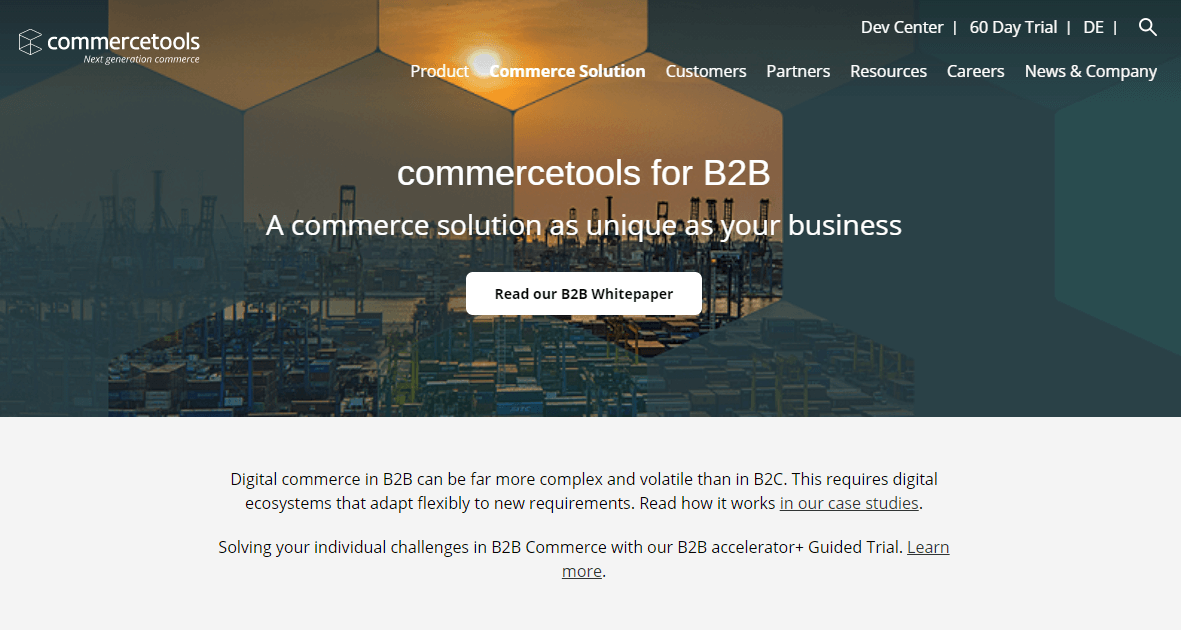
Commercetools is the world-leading B2C & B2B eCommerce platform. Especially, if you are searching for the best eCommerce platform for B2B, Commercetools is an option that you should not ignore.
Founded in 2006, for 15 years of development, Commercetools has been widely known among businesses. With offices in Germany, Netherlands, the UK, the US, and Singapore, many companies worldwide have trusted Commercetools to power their businesses.
Let’s see the highlights of this best B2B eCommerce platform:
Pros:
- Flexibility and autoscale
- Effective API-first for the complicated software ecosystem
- Cost-optimal for enterprises
Cons:
- Difficult to use for newcomer
- No storefront
Pricing: not provided
Payment methods: Card, Apple Pay, Google Pay, Klarna, PayPal, etc.
Highlighted B2B features:
- Handling complex product catalogs
- Automate product data processing
- Utilizing AI in product search and filtering, recommendation, pricing engines, personalized content, etc.
- Application Programming Interface (API)
- Automated B2B transactions between machines
- Enabling omnichannel commerce
- API-first, microservices-based architecture
Time to market: No information
14. Unilog
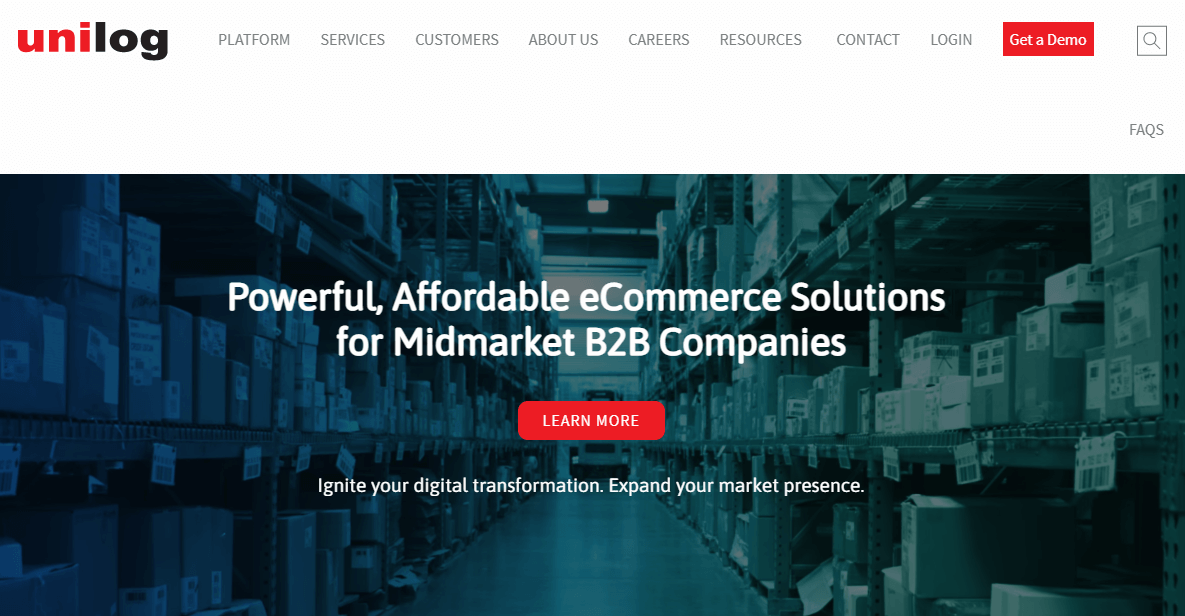
Unilog is another suggestion to develop a powerful B2B eCommerce website. Having been developing for more than 2 decades, Unilog has enough experience to bring you the top eCommerce solutions, helping your business succeed.
Unilog is a global technology company that provides B2B companies with robust and cost-effective eCommerce solutions. Distributors, retailers, and wholesalers will use its cloud-based eCommerce platform and commodity data enrichment services to boost online revenues, lower operation costs, and improve its digital channel.
Moreover, this best e-commerce platform for B2B focuses much on content. Unilog offers content services that draw and hold users on your website. Searches are converted into transactions with the help of a diverse product catalog.
Check out what this best B2B eCommerce platform brings users:
Pros:
- A helpful extended team of partners
- Consistent roadmap of development
- Effective management for store owners
- Great layouts
- Excellent supporting team
Cons:
- Complicated to use without professionals
- Difficult to customize
- Issues when using multiple browsers
- Limitations in search customization
Pricing: Contact for detail
B2B features:
- Product Information Management (PIM): Data quality checks, digital asset management, ability to publish data to other platforms
- Content Management System (CMS): Drag-n-drop tools
- Saved shopping carts
- Request for Quotes
- Multiple purchasing roles
- Quick order pads
- Flexible payment options
- Access to lines of credit
- ERP & POS integrations
- Analytics
Time to market: 90 days
15. 3dcart
3dcart offers users all functions they need to create a B2B online store and serve wholesale customers with an optimized shopping experience.
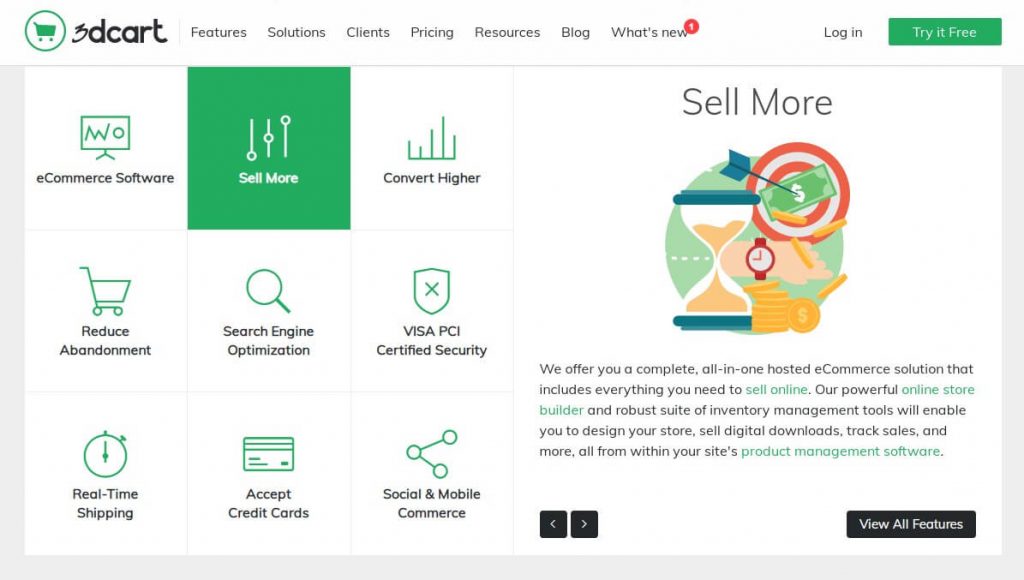
No matter who you are, wholesalers, resellers, or B2B suppliers, you can quickly generate a website based on the 3card ecommerce platform.
3dcart understands every requirement of B2B buyers and then develops various functions to meet their needs, making it possible to build a friendly website that wholesale customers fall in love with.
Users are allowed to design beautiful and rich-content product pages, set up tier price bulk discounts, and utilize Marketing performance with SEO and built-in Marketing tools.
Also, 3card guarantees an intensively personalized B2B buying experience, maximizes the ordering and reordering process, and supports flexible payment methods to serve the most customers.
Check out what this best e-commerce platform for B2B brings users:
Pros:
- More diverse features than other platforms
- 200+ built-in functions
- SEO-friendliness
- Free themes
- Multiple payment methods
- Customer segmentation
- Strong shopping cart capabilities – support every type of promotions and discounts
Cons:
- Lack of customization options
- No connection with POS system
- Basic templates
Pricing plan:
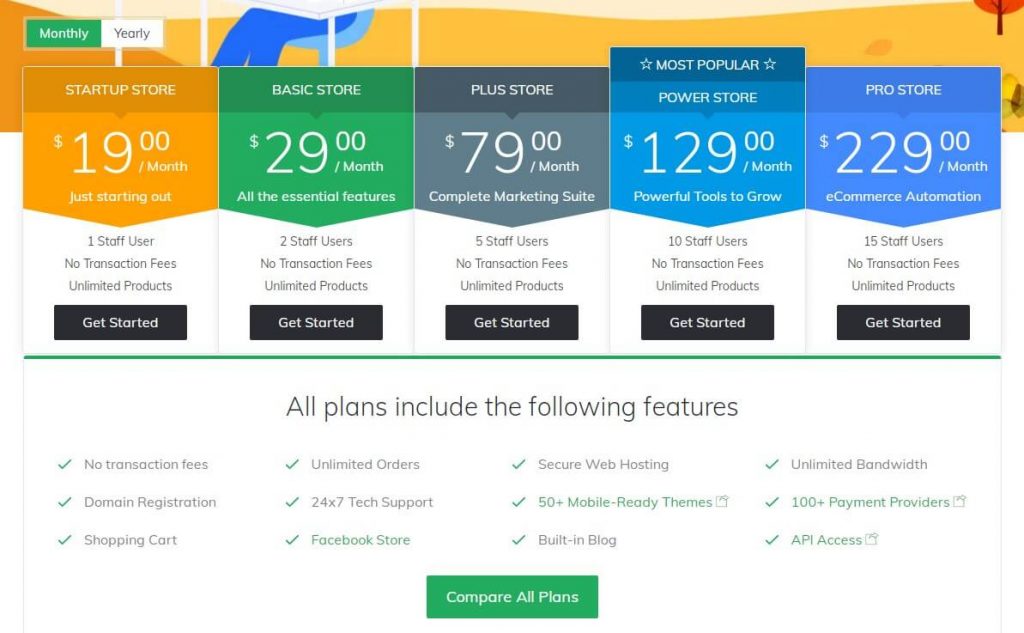
Payment providers: More than 200, including PayPal, Authorize.net, Stripe, Square,…
B2B features:
- Customer group segmentation: segment customers based on order volume, products ordered, reorder frequency, industry, location,…
- Personalized pricing and catalog
- Restricted website access
- Tier bulk price discounts
- Quick B2B ordering and reordering
- Advanced shipping features
⇒ Read More: Magento vs 3dcart.
16. TradeGecko
TradeGecko is a B2B ecommerce platform that assists users in optimizing shipping, order processing, and inventory management.
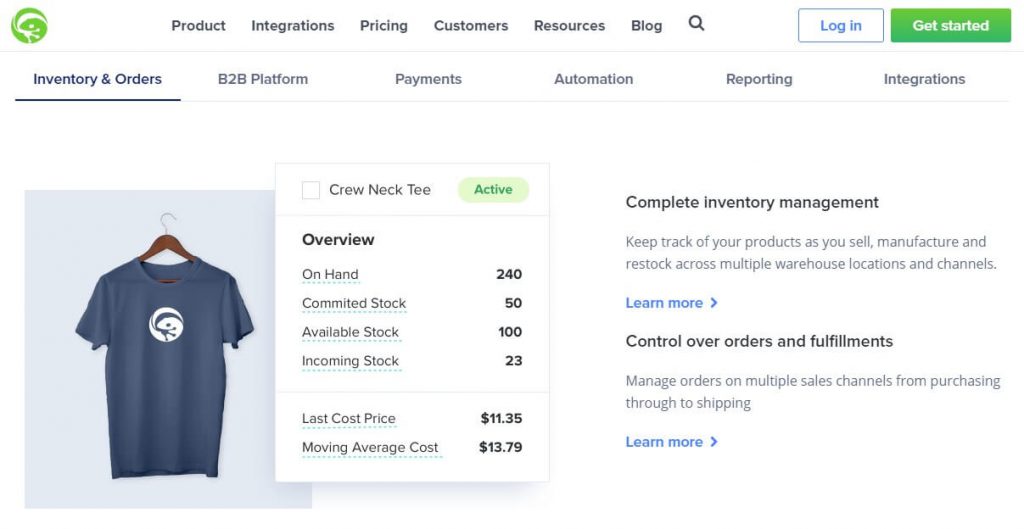
It simplifies and automates transactional processes to allow you more time to better other processes, save employee workload, and contribute to the whole improvements.
Thus, it can be said that simplicity is the main point of Tradegecko and appears as a highlighted strength between a wide range of ecommerce platforms.
Let’s see the features of this best B2B eCommerce platform:
Pros:
- Easy to use with adequate information at the fingertips
- Good integration with other software
- Multi-warehouse support
- Quick customer services
Cons:
- Limited B2B features and needs more improvements
- Low speed during the high traffic time
- Some inefficient reports when inputting and syncing data
- No payment integration to synch with the wholesale orders
- No credit limit checking
- Refund by credit card only if using the B2B
Pricing plan:
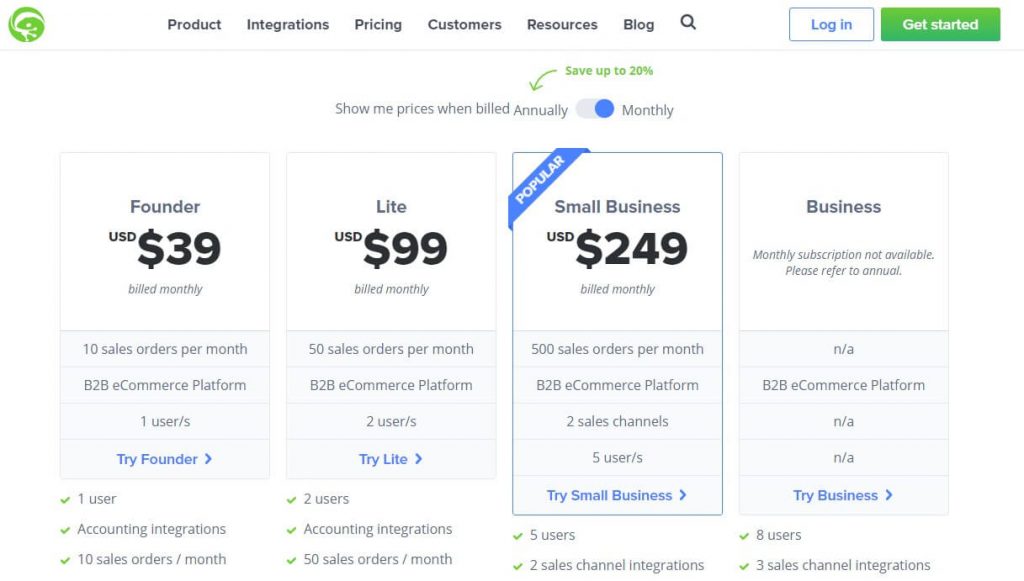
Products: Unlimited.
Payment methods: only credit card via integrated Tradegecko payment.
B2B features:
- Custom pricing and price lists
- Required customer registration
- Fast reordering
17. Yo!Kart
Yo!Kart B2B is a standalone B2B ecommerce platform for launching marketplaces similar to Alibaba. The platform has been built with multiple B2B eCommerce – specific features to facilitate ease of B2B purchase interactions.
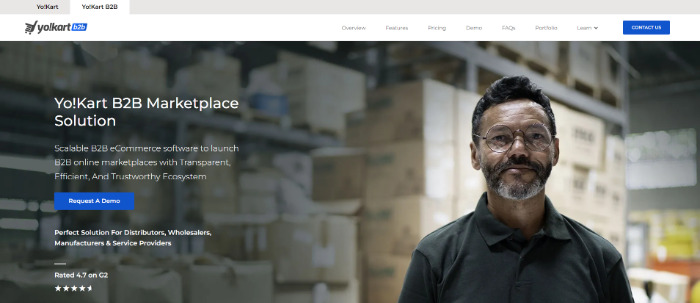
It offers key B2B requirements of negotiations, direct communication channels, bulk orders, split payments, and more. The system also allows the sale of services alongside products or independently so that a bigger pool of sellers can be onboarded and buyers get better options.
With the help of Yo!Kart B2B marketplace solution, B2B commerce can be effectively conducted online. Additionally, it is backed by an in-house Agile team for end-to-end customizations. This makes the versatile solution equally suitable for small businesses as well as enterprises.
Let’s see the highlights of this multi-vendor platform for B2B:
Pros:
- RFQ module built-in
- Multiple pre-integrated business APIs
- Extensively customizable
- License based with one-time payment ownership
- 1-year free technical support
Cons:
- Out-of-the-box themes have limited scope
- Upgrades (if needed) are paid
Pricing Plans:
Yo!Kart B2B packages are priced at $1499 (one-time) and onwards. The bundled packages include a license for lifetime use, source code ownership, one year of free technical support, and more.
Payment Methods:
- Stripe Connect
- PayFort
- Paypal
- Authorize
- Paytm
- PayU money
- PayU Biz
- Amazon
- CCAvenue
- Khipu
- Razorpay
- Citrus
- 2CheckOut
- Omise
- Brain Tree
- PayuLatam
- Transfer to Bank
- Cash on Delivery
B2B Features:
- RFQ module
- Minimum order quantity
- Bulk price discount
- One-Click Re-order
- Downloadable product documents
- Part payments
Time to Market: 15-90 Days
B2B Ecommerce Platform Comparison Chart
|
Platforms |
Pricing |
Products |
Payment Methods |
B2B Features |
Time to Market |
|
Magento |
Open Source: free Commerce: from $22,000/year Commerce Cloud: from $40,000/year |
Unlimited |
PayPal, Braintree, Klarna, Amazon Pay, Authorize.net, and Zero Subtotal Checkout. |
Essential functions for wholesale |
1-3 months |
|
Shopify Plus |
> $2,000/month |
Unlimited |
>100 methods |
Limited features |
14-60 days (a basic store) |
|
SAP Commerce Cloud |
> $100k/year, $50k/license |
Unlimited |
Cards, e-checks, digital wallets: Apple Pay, PayPal, and Visa Checkout |
Essential features for wholesale |
A few weeks |
|
Salesforce Commerce Cloud |
B2B Commerce – Starter: 1% GMV B2B Commerce – Growth: 2% GMV B2B Commerce – Plus: From 2% GMV |
From 7.500 to 750.000 |
Credit card, ACH (Automated Clearing House), or cash |
Limited B2B features |
In weeks |
|
Intershop Communications AG |
> $100.000 |
Unlimited |
Cash on delivery, direct debit transfer, invoice, cash in advance, gift card |
Essential B2B features |
No information |
|
Elastic Path Software |
> $50.000 |
Unlimited |
100+ gateways |
Essential functions for wholesale |
3 – 4 months |
|
Apttus |
Contact for more details |
Unlimited |
Debit card, credit card, purchase orders |
Basic features |
No information |
|
Sana Commerce |
Contact for more details |
Unlimited |
> 7 methods |
Essential features for wholesale |
No information |
|
Bigcommerce |
Pro plan: $270/month |
Unlimited |
> 40 methods |
Limited features – paid B2B suite with more features |
3-9 months |
|
OROCommerce |
Community Edition: Free Enterprise Edition: Not public |
Unlimited |
8 methods |
Essential functions for wholesale |
4-6 months |
|
Oracle Netsuite |
Contact for prices |
Unlimited |
< 6 methods |
Limited features |
30 days or less with support from Netsuite team |
|
Episerver |
Contact for details |
Unlimited |
Payment by phone, exchange payment, credit card payment, others |
Basic B2B functionalities |
About 2 weeks |
|
Commercetools |
Not provided |
Unlimited |
Card, Apple Pay, Google Pay, Klarna, PayPal, etc. |
Essential features |
Not provided |
|
Unilog |
Contact for details |
Unlimited |
No information |
Essential features for B2B businesses |
90 days |
|
3dcart |
Maximum plan: $229/month |
Unlimited |
>200 methods |
Essential functions for wholesale |
No information |
|
Tradegecko |
Popular plan: $249/month |
Unlimited |
only credit card via integrated Tradegecko payment |
Limited features |
No information |
IV. How to choose the best B2B eCommerce platform
After knowing crucial features for a B2B ecommerce platform to support building a website, deciding which platform to use now continues to be a challenge for store owners.
Aside from the built-in B2B functionality, it is critical to consider a variety of factors that may significantly impact website performance and additional support in the future.
Please note that when it comes to specific business models, typically B2B and B2C, eCommerce platforms separate unique capabilities to suit each business’s needs.
1. Platform type
Platform type may be considered the first aspect in selecting the right ecommerce platform.
Each type contains particular features and provides users with diverse experiences.
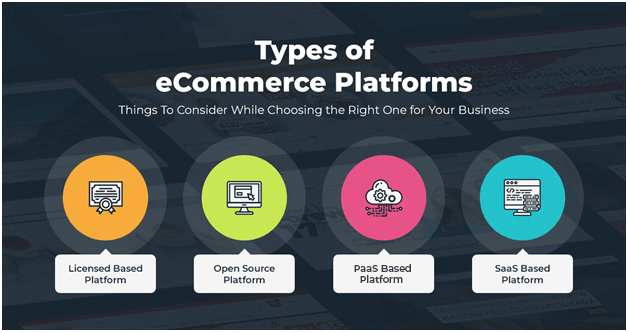
Source: The Newsify
Licensed platform: You need to purchase a license fee upfront and then renew it annually.
Open Source platform: Generally, the Open source platform shares many similarities with the traditional platform. The primary difference is no need for an upfront fee to acquire a license. Additionally, it is convenient that you can control everything you desire because the source code is now in your hand.
Paas platform: stands for Platform as a Service to build your software to connect with other systems. This platform type suits large companies, especially B2b enterprises, to process complicated aspects and complete them.
SASS platform: stands for Software as a Service that stays in the cloud and can be accessed via the web browser. It is not necessary to download anything when using this platform. All you need to do is simply connect to the Internet, log in to your account, and conduct your business.
2. Out-of-box B2B functionality
Needless to say, the right B2B ecommerce platforms must cover adequate B2B features to operate and handle business issues thoroughly.
With a tight budget, it would be better to pick a platform that is equipped with enough function – save money for extra tools or customized services.
3. Marketing functionality
Besides products, customers, and order management, marketing is a decisive factor in deciding which platform fits your business.
This availability lets your website actively perform in-house Marketing actions, from discount rules to SEO-related concerns, contributing to boosting sales.
The more diversity of Marketing features are provided, the more efficiency you achieve during the operation process.
4. Maintenance & security
These two components specify how a website is protected and maintained instantly to work sleekly.
You had better select an ecommerce platform that braces security walls (PCI compliance, for example) to avoid hackers’ attacks and exposes maintenance policy to empower website performance.

5. Customization
Never underestimate the customization ability of a B2B platform! One of our customers has shared that they would shift to another platform due to the less flexibility to customize functions and lack of external plugin/service providers from the old ecommerce platform.
It is a fact that no B2B ecommerce platform encompasses everything you are craving. Thus, let’s make a dash for a platform with highly customizable features to strengthen websites whenever you demand a modification.
6. Mobile compatibility
In the era of mobile around every corner of modern life, you will surely lose both customers and money if you don’t guarantee a mobile-friendly interface for your website.
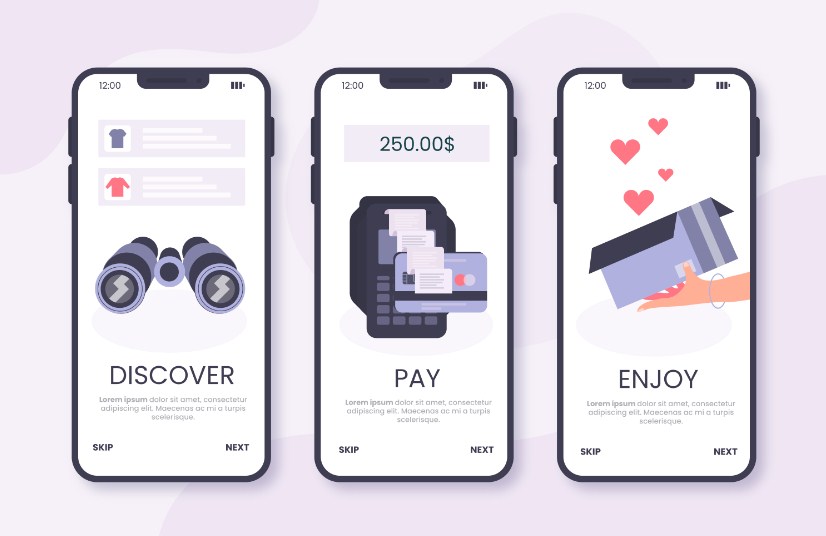
According to a recent study, the world witnessed 5.11 billion unique mobile users in 2019, and 2.71 billion out of them use smartphones.
Hence, to win this vast number of mobile users, B2B online stores are forced to seek an ecommerce platform that is compatible with mobile devices.
Responsive design, good UI/UX on mobiles along seamless user experience, are keys to success and dominating the market.
7. Integrations
B2B merchants ought to take into account integrations to utilize the business operation.
Integrations are useful tools (ERP, POS, CRM) to connect with your system, then sync data and automate order fulfillment, inventory synchronization, product catalog syndication, and more.
These integrations help leverage business performance, save human resources and costs considerably, and create an effortless workflow between stages.
When it comes to a B2B eCommerce platform, you should ask for more information on integrations and specify how it handles your ERP or CRM and predicts the complexity before installing and configuring.
8. Costs
Money may be one of the top priorities to consider an ecommerce platform. A more expensive platform does not mean the good one, but it can provide you with unlimited useful features and dedicated support.
Let’s carefully assess the pricing plan aligned with features to decide the most suitable platform for your business needs.
9. Time to market
This factor does play an important role in deciding which is the best eCommerce platform for B2B. Each platform requires merchants to spend an amount of time building a B2B website and the figures are not entirely the same. Suppose the B2B eCommerce platform is quite complicated and requires a lot of technical skill. In that case, the time to market is more than another platform that is designed for merchants without any technical knowledge.
V. B2B solutions for Magento – One of The Best B2B eCommerce platforms
Magento ECommerce edition is costly for you; it’s definitely right! You need to pay an annual fee based on your revenue, as Magento proposes.
Thus, we deliver other optimized solutions for you – still use Magento open source but cover every B2B function on the website: Magento 2 B2B extension package & Multi-platform B2B web development service.
>>> QUICK JUMP NOW: Explore Magento B2B Module Package to verify whether it fits.
Built on default B2B features and a day-to-day effort of the product team, BSS Commerce launched this solution package more than one year ago, as a pioneer in this market.
Our Magento 2 B2B extension package allows you – a B2B merchant, to form your website with various functions belonging to:
- Access Restrictions: The B2B solution Magento 2 forces customers to login before viewing websites and restrict category, product, and CMS pages for specific customer groups
- B2B Identity and Management: streamline B2B registration with unlimited fields to gather customer information, manage company accounts, and assign customer sales reps.
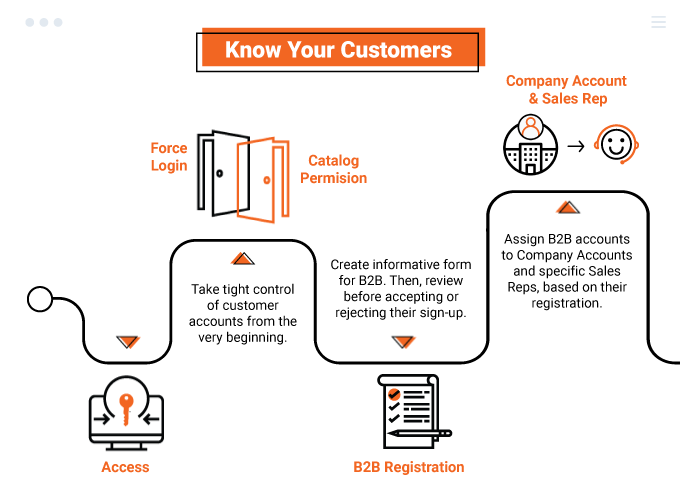
- Pricing Strategy: Magento 2 B2B extensions determine hiding prices for products, customize pricing for specific customer groups, and provide quotation features for the B2B dealing process.
- Ordering Process: allow order in bulks, add multiple products to cart, and fasten ordering configurable products in a grid. Besides, quick reordering also empowers the purchase process in the blink of an eye.
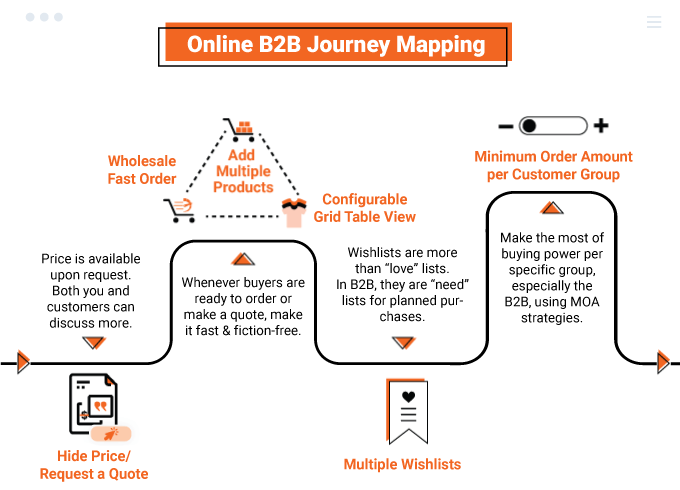
- Flexible Refund: Magento 2 B2B extensions keep the money to stay inside the store with a credit refund.
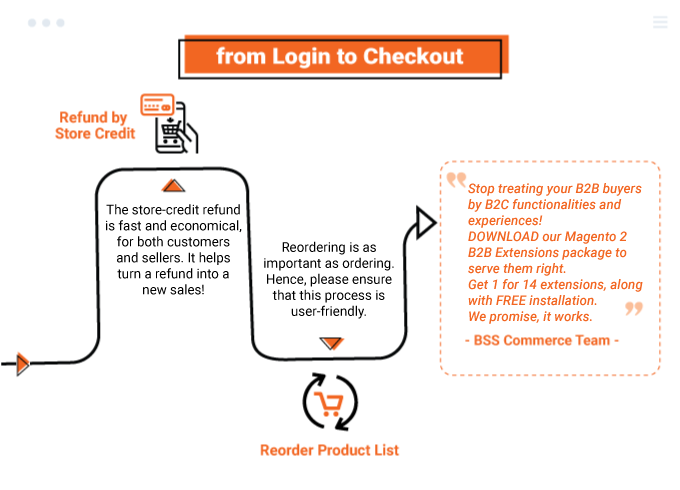
In more detail, the B2B solution Magento 2 combines a lot of B2B extensions, then defines a workflow between them and guarantees the best compatibility to work well on any website.
The combination promises to sharpen B2B websites from A to Z, create a seamless user experience in the first place and contribute to rocketing sales.
Pricing plan:
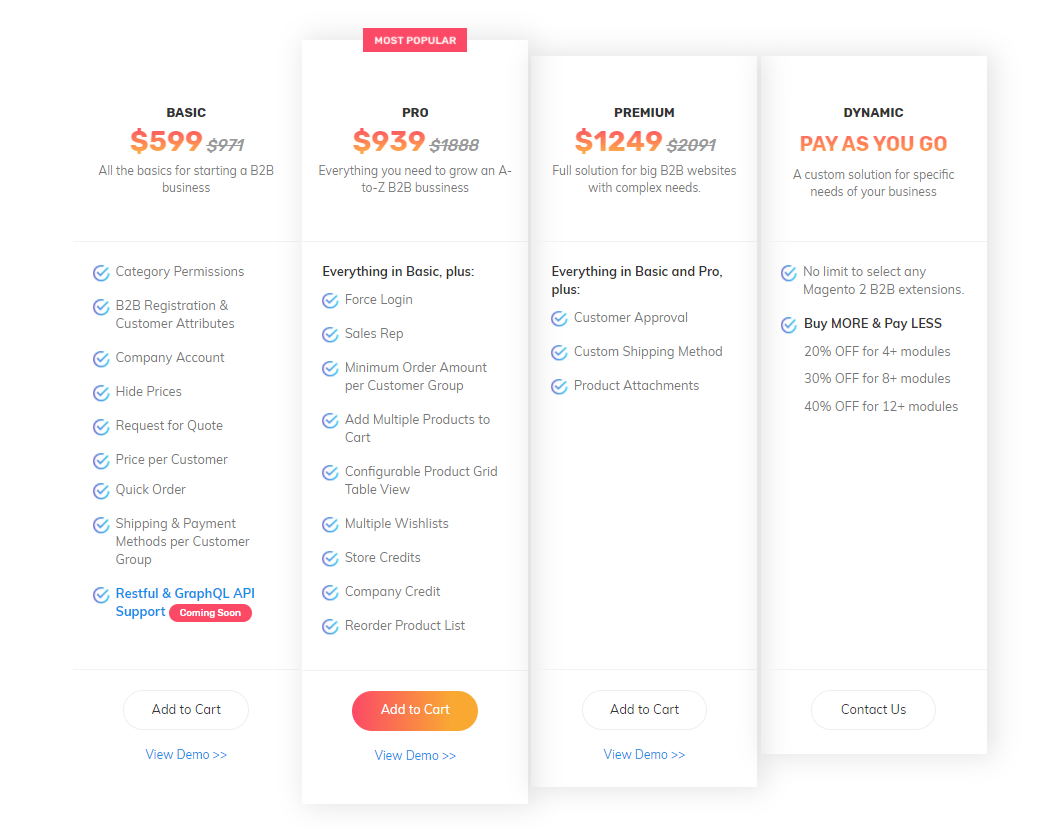
BSS Commerce has been putting tons of effort into researching B2B models, B2B customer behavior, and B2B websites to develop the most stunning features in the Magento 2 B2B extension package.
Since the Magento 2 B2B extension package was launched during the past year, we approached hundreds of global customers and resolved various issues related to their wholesale business.
>>> DON’T FORGET to Check B2B ECommerce Trends To Prepare For The Year-To-Come or else you’ll regret it later!
VI. Conclusion
B2B Ecommerce platforms are a must for every enterprise that desires to do wholesale business online. We hope that this article will give you a hand in choosing the right platform to build your website, suit your budget, and target customers.
For those seeking more sharpened Magento 2 B2B solutions, DON’T SKIP our Magento eCommerce extensions!
BSS Commerce is one of the leading Magento extension providers and web development services globally. With experienced and certified Magento developers, we commit to bringing high-quality products and services to optimize your business effectively. Furthermore, we offer FREE Installation – FREE 1-year Support and FREE Lifetime Update for every Magento extension.
CONTACT NOW to let us know your problems. We are willing to support you every time.

